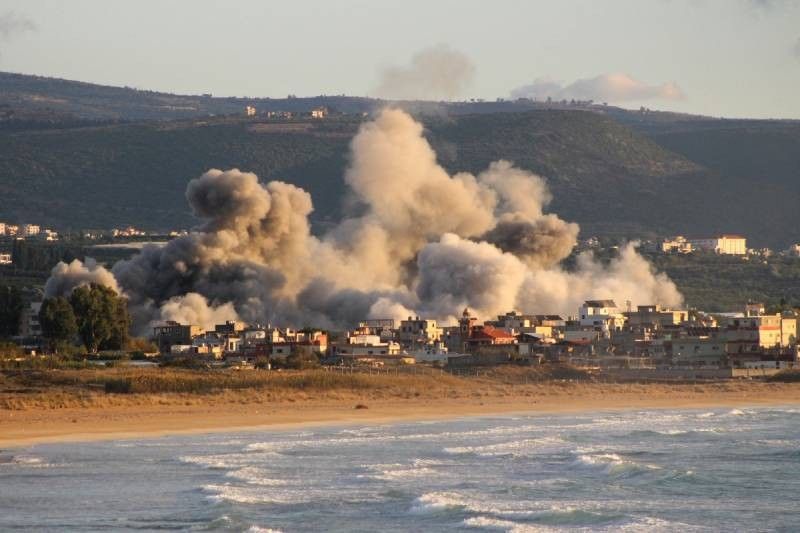Ceasefire to begin in Israel-Hezbollah war

JERUSALEM, undefined — US President Joe Biden said a Lebanon truce would take effect early Wednesday, after Prime Minister Benjamin Netanyahu said a ceasefire with Hezbollah would allow Israel to focus its attention on Hamas and arch-enemy Iran.
The ceasefire will begin at 4:00 am local time (0200 GMT), Biden said, speaking at the White House after Netanyahu's office said his ministers had approved the deal.
The United States, European Union, United Nations and G7 have all pushed for a halt in the fighting between Israel and Iran-backed Hezbollah after more than a year of violence.
The United States is Israel's key ally and military backer, and Biden hailed the deal as "good news" and a "new start" for Lebanon.
Netanyahu thanked Biden for his "involvement" in brokering the agreement.
Ten ministers voted in favour and one against, the Israeli premier's office said.
Biden and French President Emmanuel Macron said the ceasefire would protect Israel from Hezbollah and create the conditions for a "lasting calm".
The United States and France will ensure the deal is "fully implemented", a joint statement said.
In a televised address ahead of his security cabinet vote, Netanyahu said: "The length of the ceasefire depends on what happens in Lebanon."
The announcement followed the heaviest day of raids on Beirut -- including a series of strikes in the city's centre -- since Israel stepped up its air campaign in Lebanon in late September before sending in ground troops.
Hours ahead of the ceasefire taking effect, the Israeli army ordered the evacuation of residents in areas of central Beirut and the southern suburbs of the city.
Hezbollah, which has yet to make an official statement on the truce, said Tuesday evening it launched drones at "sensitive military targets" in Tel Aviv in response to the deadly Israeli strikes in Beirut.
The militant group also claimed responsibility for attacks on northern Israel after the agreement was announced.
The armed group has suffered staggering losses in recent weeks, including the death in an air strike of its leader Hassan Nasrallah.
Hezbollah did not participate directly in the talks for the truce, with Lebanese parliamentary speaker Nabih Berri mediating on its behalf.
'Permanent cessation of hostilities'
Pressure for Israel to accept a deal had been mounting, with G7 foreign ministers on Tuesday calling for an "immediate ceasefire".
Lebanese Prime Minister Najib Mikati, after demanding that the international community "act swiftly" to ensure the truce's implementation, said he was committed to strengthening the presence of the army in south Lebanon.
Hezbollah was the only armed group that refused to surrender its weapons after the 1975-1990 Lebanese civil war ended.
To date, the armed group has maintained a stronger presence in south Lebanon than the national army.
Biden said the ceasefire deal was designed to be a "permanent cessation of hostilities" between Israel and Hezbollah.
Under the agreement, the Lebanese army would take control of the border area on their side and "what is left of Hezbollah and other terrorist organisations will not be allowed... to threaten the security of Israel again", he said.
Netanyahu said in his speech that Israel would maintain "full" freedom to act, even after the ceasefire.
He said a truce would permit Israel to redirect its efforts back to Gaza, where it has been at war with Hezbollah ally Hamas since October of last year.
"When Hezbollah is out of the picture, Hamas is left alone in the fight. Our pressure on it will intensify," he said.
The agreement would also enable "focusing on the Iranian threat" and give Israel's military time to resupply, he said.
Iran is the main backer of both Hezbollah and Hamas, as well as other regional proxies that profess to be at war with Israel.
Iran itself has fired two barrages of missiles and drones at Israel since the Gaza war began, most of which were intercepted by Israel or its allies.
'Belt of fire'
Ahead of Netanyahu's announcement, Lebanese state media reported that three strikes hit Beirut's central Nweiri neighbourhood and destroyed a "four-storey building housing displaced people".
The health ministry said the first strike killed seven people and wounded 37.
"We were blown away and the walls fell on top of us," said Rola Jaafar, who lives in the building opposite.
The state-run NNA said Israeli strikes had created "a belt of fire" Tuesday around Beirut's southern suburbs.
The Israeli military said it had attacked Hezbollah targets in Beirut, including "components of Hezbollah's financial system", as well as many others in south Lebanon.
Its troops had also "engaged in close-quarters combat with terrorists" and destroyed hidden weapons caches during raids near the border.
'De-escalating tensions'
Hezbollah said it was acting in support of Hamas when it began firing into Israel after the October 7, 2023 attack that sparked the war in Gaza.
Lebanon says at least 3,823 people have been killed in the country since October 2023, most of them in the past several weeks.
On the Israeli side, the hostilities with Hezbollah have killed at least 82 soldiers and 47 civilians, authorities say.
The initial exchanges forced tens of thousands of Israelis from their homes, and Israeli officials have said they are fighting so they can return safely.
Sustained efforts this year by mediators to secure a truce and hostage-release deal in the Gaza war have failed.
But US Secretary of State Antony Blinken suggested that a Lebanon ceasefire could change that, telling reporters that "by de-escalating tensions in the region, it can also help us to end the conflict in Gaza".
Hamas's October 7 attack on Israel last year resulted in the deaths of 1,207 people, most of them civilians, according to an AFP tally of Israeli official figures.
Israel's retaliatory campaign has killed 44,249 people in Gaza, according to figures from the Hamas-run territory's health ministry that the United Nations considers reliable.
- Latest
- Trending

































